Pharismusyoka99
On this page, you find all documents, package deals, and flashcards offered by seller pharismusyoka99.
- 981
- 0
- 0
Community
- Followers
- Following
981 items
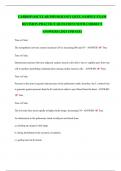
CARDIOVASCULAR PHYSIOLOGY QUESTIONS. SAMPLE EXAM REVISION PRACTICE QUESTIONS WITH CORRECT ANSWERS (2024 UPDATE)
What best describes the Frank-Starling law? a.) The greater the volume of blood discharged from the heart, the greater the pressure required to discharge the blood b.) The slower the heart rate, the greater the cardiac output c.) The greater the SV, the greater the HR d.) the more the ventricular muscles are stretched, the more forcefully they contract - ANSWER- d.) the more the ventricular muscles are stretched, the more forcefully they contract Which hormone decreases cardiac output by...
- Exam (elaborations)
- • 7 pages •
What best describes the Frank-Starling law? a.) The greater the volume of blood discharged from the heart, the greater the pressure required to discharge the blood b.) The slower the heart rate, the greater the cardiac output c.) The greater the SV, the greater the HR d.) the more the ventricular muscles are stretched, the more forcefully they contract - ANSWER- d.) the more the ventricular muscles are stretched, the more forcefully they contract Which hormone decreases cardiac output by...
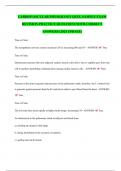
CARDIOVASCULAR PHYSIOLOGY QUIZ. SAMPLE EXAM REVISION PRACTICE QUESTIONS WITH CORRECT ANSWERS (2024 UPDATE)
The sympathetic nervous system increases CO by increasing HR and SV - ANSWER- True True or False: Desmosomes present between adjacent cardiac muscle cells allow ions to rapidly pass from one cell to another, permitting communication among cardiac muscle cells. - ANSWER- False True or False: Pressure in the aorta is greater than pressure in the pulmonary trunk; therefore, the L ventricle has to generate greater pressure than the R ventricle in order to eject blood from the heart - ANSWER- ...
- Exam (elaborations)
- • 7 pages •
The sympathetic nervous system increases CO by increasing HR and SV - ANSWER- True True or False: Desmosomes present between adjacent cardiac muscle cells allow ions to rapidly pass from one cell to another, permitting communication among cardiac muscle cells. - ANSWER- False True or False: Pressure in the aorta is greater than pressure in the pulmonary trunk; therefore, the L ventricle has to generate greater pressure than the R ventricle in order to eject blood from the heart - ANSWER- ...
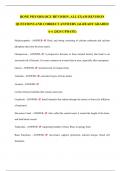
BONE PHYSIOLOGY REVISION. ALL EXAM REVISION QUESTIONS AND CORRECT ANSWERS (ALREADY GRADED A+) (2024 UPDATE)
Hydroxyapatite - ANSWER- Hard, and strong consisting of calcium carbonate and calcium phosphate that form the bone matrix. Osteoporosis - ANSWER- A progressive decrease in bone mineral density that leads to an increased risk of fracture. It is more common in women than in men, especially after menopause. Osteon - ANSWER- structural unit of compact bone Lamellae - ANSWER- concentric layers of bone matrix Lacunae - ANSWER- . cavities between lamellae that contain osteocytes Canaliculi - AN...
- Exam (elaborations)
- • 4 pages •
Hydroxyapatite - ANSWER- Hard, and strong consisting of calcium carbonate and calcium phosphate that form the bone matrix. Osteoporosis - ANSWER- A progressive decrease in bone mineral density that leads to an increased risk of fracture. It is more common in women than in men, especially after menopause. Osteon - ANSWER- structural unit of compact bone Lamellae - ANSWER- concentric layers of bone matrix Lacunae - ANSWER- . cavities between lamellae that contain osteocytes Canaliculi - AN...
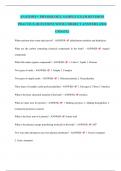
ANATOMY+ PHYSIOLOGY. SAMPLE EXAM REVISION PRACTICE QUESTIONS WITH CORRECT ANSWERS (2024 UPDATE)
What reactions does water take part in? - ANSWER- dehydration synthesis and hydrolysis What are the carbon containing chemical compounds in the body? - ANSWER- organic compounds What falls under organic compounds? - ANSWER- 1. Carbs 2. Lipids 3. Proteins Two types of carbs: - ANSWER- 1. Simple 2. Complex Two types of simple carbs: - ANSWER- 1. Monosaccharides 2. Disaccharides Three types of complex carbs (polysaccharides) - ANSWER- 1. Glycogen 2. Fibers 3. Starches What is the basic struc...
- Exam (elaborations)
- • 8 pages •
What reactions does water take part in? - ANSWER- dehydration synthesis and hydrolysis What are the carbon containing chemical compounds in the body? - ANSWER- organic compounds What falls under organic compounds? - ANSWER- 1. Carbs 2. Lipids 3. Proteins Two types of carbs: - ANSWER- 1. Simple 2. Complex Two types of simple carbs: - ANSWER- 1. Monosaccharides 2. Disaccharides Three types of complex carbs (polysaccharides) - ANSWER- 1. Glycogen 2. Fibers 3. Starches What is the basic struc...
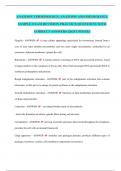
HUMAN ANATOMY AND PHYSIOLOGY. SAMPLE EXAM REVISION PRACTICE QUESTIONS WITH CORRECT ANSWERS (2024 UPDATE)
Flagella - ANSWER- A long cellular appendage specialized for locomotion, formed from a core of nine outer doublet microtubules and two inner single microtubules, ensheathed in an extension of plasma membrane. (propel the cell) Ribosomes - ANSWER- A minute particle consisting of RNA and associated proteins, found in large numbers in the cytoplasm of living cells. They bind messenger RNA and transfer RNA to synthesize polypeptides and proteins. Rough endoplasmic reticulum - ANSWER- part of t...
- Exam (elaborations)
- • 11 pages •
Flagella - ANSWER- A long cellular appendage specialized for locomotion, formed from a core of nine outer doublet microtubules and two inner single microtubules, ensheathed in an extension of plasma membrane. (propel the cell) Ribosomes - ANSWER- A minute particle consisting of RNA and associated proteins, found in large numbers in the cytoplasm of living cells. They bind messenger RNA and transfer RNA to synthesize polypeptides and proteins. Rough endoplasmic reticulum - ANSWER- part of t...

ANATOMY TERMINOLOGY, ANATOMY AND PHYSIOLOGY ALL EXAM REVISION QUESTIONS AND CORRECT ANSWERS (ALREADY GRADED A+) (2024 UPDATE) 100%
Interphase - ANSWER- Cell grows, performs its normal functions, and prepares for division; consists of G1, S, and G2 phases G1 phase - ANSWER- The first gap, or growth phase, of the cell cycle, consisting of the portion of interphase before DNA synthesis begins. (23 chromosomes = 2n) S phase - ANSWER- The synthesis phase of the cell cycle; the portion of interphase during which DNA is replicated. G2 phase - ANSWER- The second growth phase of the cell cycle, consisting of the portion of in...
- Exam (elaborations)
- • 11 pages •
Interphase - ANSWER- Cell grows, performs its normal functions, and prepares for division; consists of G1, S, and G2 phases G1 phase - ANSWER- The first gap, or growth phase, of the cell cycle, consisting of the portion of interphase before DNA synthesis begins. (23 chromosomes = 2n) S phase - ANSWER- The synthesis phase of the cell cycle; the portion of interphase during which DNA is replicated. G2 phase - ANSWER- The second growth phase of the cell cycle, consisting of the portion of in...
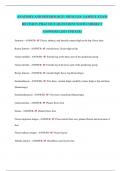
ANATOMY AND PHYSIOLOGY- MUSCLES. SAMPLE EXAM REVISION PRACTICE QUESTIONS WITH CORRECT ANSWERS (2024 UPDATE)
Sartorius - ANSWER- Flexes, abducts, and laterally rotates thigh at the hip; flexes knee Rectus femoris - ANSWER- extends knee, flexes thigh at hip Vastus medialis - ANSWER- Extends leg at the knee; part of the quadriceps group Vastus lateralis - ANSWER- Extends leg at the knee; part of the quadriceps group Biceps femoris - ANSWER- extends thigh; flexes leg (Hamstrings) Semitendinosis - ANSWER- Flex knee; extends thigh; medially rotates thigh at hip and knee (Hamstrings) Semimembranosis -...
- Exam (elaborations)
- • 5 pages •
Sartorius - ANSWER- Flexes, abducts, and laterally rotates thigh at the hip; flexes knee Rectus femoris - ANSWER- extends knee, flexes thigh at hip Vastus medialis - ANSWER- Extends leg at the knee; part of the quadriceps group Vastus lateralis - ANSWER- Extends leg at the knee; part of the quadriceps group Biceps femoris - ANSWER- extends thigh; flexes leg (Hamstrings) Semitendinosis - ANSWER- Flex knee; extends thigh; medially rotates thigh at hip and knee (Hamstrings) Semimembranosis -...

ANATOMY AND PHYSIOLOGY. SAMPLE EXAM REVISION PRACTICE QUESTIONS WITH CORRECT ANSWERS (2024 UPDATE)
ANATOMY AND PHYSIOLOGY. SAMPLE EXAM REVISION PRACTICE QUESTIONS WITH CORRECT ANSWERS (2024 UPDATE)
- Exam (elaborations)
- • 7 pages •
ANATOMY AND PHYSIOLOGY. SAMPLE EXAM REVISION PRACTICE QUESTIONS WITH CORRECT ANSWERS (2024 UPDATE)
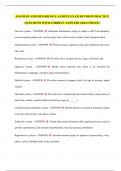
ANATOMY AND PHYSIOLOGY. SAMPLE EXAM REVISION PRACTICE QUESTIONS WITH CORRECT ANSWERS (2024 UPDATE)
ANATOMY AND PHYSIOLOGY. SAMPLE EXAM REVISION PRACTICE QUESTIONS WITH CORRECT ANSWERS (2024 UPDATE)
- Exam (elaborations)
- • 6 pages •
ANATOMY AND PHYSIOLOGY. SAMPLE EXAM REVISION PRACTICE QUESTIONS WITH CORRECT ANSWERS (2024 UPDATE)
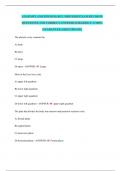
ANATOMY AND PHYSIOLOGY, MIDTERM EXAM REVISION QUESTIONS AND CORRECT ANSWERS (GRADED A+) (100% GUARANTEE) (2024 UPDATE)
The pleural cavity contains the A) brain B) heart C) lungs D) spine - ANSWER- Lungs Most of the liver lies in the A) upper left quadrant B) lower right quadrant C) upper right quadrant D) lower left quadrant - ANSWER- upper right quadrant The plan that divides the body into anterior and posterior sections is the A) frontal plane B) sagittal plane C) transverse plane D) horizontal plane - ANSWER- Frontal plane The body is divided into several _______. Examples include integumentary...
- Exam (elaborations)
- • 36 pages •
The pleural cavity contains the A) brain B) heart C) lungs D) spine - ANSWER- Lungs Most of the liver lies in the A) upper left quadrant B) lower right quadrant C) upper right quadrant D) lower left quadrant - ANSWER- upper right quadrant The plan that divides the body into anterior and posterior sections is the A) frontal plane B) sagittal plane C) transverse plane D) horizontal plane - ANSWER- Frontal plane The body is divided into several _______. Examples include integumentary...
